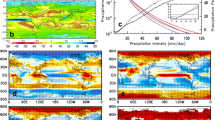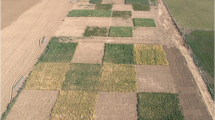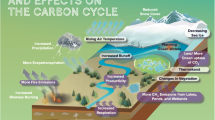Abstract
Understanding how global change drivers (GCDs) affect aboveground net primary production (ANPP) through time is essential to predicting the reliability and maintenance of ecosystem function and services in the future. While GCDs, such as drought, warming and elevated nutrients, are known to affect mean ANPP, less is known about how they affect inter-annual variability in ANPP. We examined 27 global change experiments located in 11 different herbaceous ecosystems that varied in both abiotic and biotic conditions, to investigate changes in the mean and temporal variability of ANPP (measured as the coefficient of variation) in response to different GCD manipulations, including resource additions, warming, and irrigation. From this comprehensive data synthesis, we found that GCD treatments increased mean ANPP. However, GCD manipulations both increased and decreased temporal variability of ANPP (24% of comparisons), with no net effect overall. These inconsistent effects on temporal variation in ANPP can, in part, be attributed to site characteristics, such as mean annual precipitation and temperature as well as plant community evenness. For example, decreases in temporal variability in ANPP with the GCD treatments occurred in wetter and warmer sites with lower plant community evenness. Further, the addition of several nutrients simultaneously increased the sensitivity of ANPP to interannual variation in precipitation. Based on this analysis, we expect that GCDs will likely affect the magnitude more than the reliability over time of ecosystem production in the future.



Similar content being viewed by others
References
Andresen LC, Müller C, de Dato G et al (2016) Shifting impacts of climate change: long-term patterns of plant response to elevated CO2, drought, and warming across ecosystems. In: Dumbrell AJ, Kordas RL, Woodward G (eds) Advances in Ecological Research. Oxford Academic Press, Oxford, UK, pp 437–473
Avolio ML, Koerner SE, La Pierre KJ et al (2014) Changes in plant community composition, not diversity, during a decade of nitrogen and phosphorus additions drive above-ground productivity in a tallgrass prairie. J Ecol 102:1649–1660. https://doi.org/10.1111/1365-2745.12312
Borer ET, Seabloom EW, Gruner DS et al (2014) Herbivores and nutrients control grassland plant diversity via light limitation. Nature 508:517–520. https://doi.org/10.1038/nature13144
Chamberlain S (2018) rnoaa: “NOAA” Weather Data from R. https://CRAN.R-project.org/package=rnoaa
Clark JS, Carpenter SR, Barber M et al (2001) Ecological forecasts: an emerging imperative. Science 80-(293):657–660. https://doi.org/10.1126/science.293.5530.657
Clements FE (1916) Plant succession; an analysis of the development of vegetation. Carnegie Institue of Washington, Washington
Collins SL, Belnap J, Grimm NB et al (2014) A multiscale, hierarchical model of pulse dynamics in arid-land ecosystems. Annu Rev Ecol Evol Syst 45:397–419. https://doi.org/10.1146/annurev-ecolsys-120213-091650
Daily GC, Polasky S, Goldstein J et al (2009) Ecosystem services in decision making: time to deliver. Front Ecol Environ 7:21–28. https://doi.org/10.1890/080025
Darling ES, Côté IM (2008) Quantifying the evidence for ecological synergies. Ecol Lett 11:1278–1286. https://doi.org/10.1111/j.1461-0248.2008.01243.x
Elser JJ, Bracken MES, Cleland EE et al (2007) Global analysis of nitrogen and phosphorus limitation of primary producers in freshwater, marine and terrestrial ecosystems. Ecol Lett 10:1135–1142. https://doi.org/10.1111/j.1461-0248.2007.01113.x
Fay PA, Prober SM, Harpole WS et al (2015) Grassland productivity limited by multiple nutrients. Nat Plants 1:15080. https://doi.org/10.1038/nplants.2015.80
Grman E, Lau JA, Schoolmaster DR, Gross KL (2010) Mechanisms contributing to stability in ecosystem function depend on the environmental context. Ecol Lett 13:1400–1410. https://doi.org/10.1111/j.1461-0248.2010.01533.x
Gross K, Cardinale BJ, Fox JW et al (2014) Species richness and the temporal stability of biomass production: a new analysis of recent biodiversity experiments. Am Nat 183:1–12. https://doi.org/10.1086/673915
Hallett LM, Hsu J, Cleland EE et al (2014) Biotic mechanisms of community stability shift along a precipitation gradient. Ecology 95:1693–1700
Hallett LM, Avolio ML, Carroll I et al (2019) codyn: Community Dynamics Metrics. https://CRAN.R-project.org/package=codyn
Harpole WS, Sullivan LL, Lind EM et al (2016) Addition of multiple limiting resources reduces grassland diversity. Nature 537:93–96. https://doi.org/10.1038/nature19324
Hautier Y, Seabloom EW, Borer ET et al (2014) Eutrophication weakens stabilizing effects of diversity in natural grasslands. Nature 508:521–525. https://doi.org/10.1038/nature13014
Hautier Y, Tilman D, Isbell F et al (2015) Anthropogenic environmental changes affect ecosystem stability via biodiversity. Science 80-(348):336–340
Hector A, Schmid B, Beierkuhnlein C et al (1999) Plant diversity and productivity experiments in European grasslands. Science 80-(286):1123–1127
Hector A, Hautier Y, Saner P et al (2010) General stabilizing effects of plant diversity on grassland productivity through population asynchrony and overyielding. Ecology 91:2213–2220. https://doi.org/10.1890/09-1162.1
Hoover DL, Knapp AK, Smith MD (2014) Resistance and resilience of a grassland ecosystem to climate extremes. Ecology 95:2646–2656. https://doi.org/10.1890/13-2186.1
Houseman GR, Mittelbach GG, Reynolds HL, Gross KL (2008) Perturbations alter community convergence, divergence, and formation of multiple community states. Ecology 89:2172–2180. https://doi.org/10.1890/07-1228.1
Huxman TE, Smith MD, Fay PA et al (2004) Convergence across biomes to common rain use efficiency. Nature 429:651–654. https://doi.org/10.1038/nature02597.1
Isbell F, Craven D, Connolly J et al (2015) Biodiversity increases the resistance of ecosystem productivity to climate extremes. Nature 526:574–577. https://doi.org/10.1038/nature15374
Ives AR, Carpenter SR (2007) Stability and diversity of ecosystems. Science 317:58–63. https://doi.org/10.1126/science.1133258
Knapp AK, Smith MD (2001) Variation among biomes in temporal dynamics of aboveground primary production. Science 80-(291):481–484
Knapp AK, Briggs JM, Koelliker JK (2001) Frequency and extent of water limitation to primary production in a mesic temperate grassland. Ecosystems 4:19–28. https://doi.org/10.1007/s100210000057
Knapp AK, Ciais P, Smith MD (2017) Reconciling inconsistencies in precipitation–productivity relationships: implications for climate change. New Phytol 214:41–47. https://doi.org/10.1111/nph.14381
Koerner SE, Avolio ML, La Pierre KJ et al (2016) Nutrient additions cause divergence of tallgrass prairie plant communities resulting in loss of ecosystem stability. J Ecol 104:1478–1487. https://doi.org/10.1111/1365-2745.12610
Komatsu KJ, Avolio ML, Lemoine NP et al (2019) Global change effects on plant communities are magnified by time and the number of global change factors imposed. Proc Natl Acad Sci 116:17867–17873. https://doi.org/10.1073/pnas.1819027116
La Pierre KJ, Blumenthal DM, Brown CS et al (2016) Drivers of variation in aboveground net primary productivity and plant community composition differ across a broad precipitation gradient. Ecosystems 19:521–533. https://doi.org/10.1007/s10021-015-9949-7
Ladwig LM, Collins SL, Swann AL et al (2012) Above- and belowground responses to nitrogen addition in a Chihuahuan Desert grassland. Oecologia 169:177–185. https://doi.org/10.1007/s00442-011-2173-z
Lehman CL, Tilman D (2000) Biodiversity, stability, and productivity in competitive communities. Am Nat 156:534–552. https://doi.org/10.1086/303402
Lepš J, Osbornová-Kosinová J, Rejmánek M (1982) Community stability, complexity and species life history strategies. Vegetatio 50:53–63. https://doi.org/10.1007/BF00120678
Leuzinger S, Luo Y, Beier C et al (2011) Do global change experiments overestimate impacts on terrestrial ecosystems? Trends Ecol Evol 26:236–241. https://doi.org/10.1016/j.tree.2011.02.011
MacArthur RH (1955) Fluctuations of animal populations and a measure of community stability. Ecology 36:533–536
MacGillivray CW, Grime JP (1995) Testing predictions of the resistance and resilience of vegetation subjected to extreme events. Funct Ecol 9:640–649. https://doi.org/10.1093/imammb/20.4.367
May RM (1973) Stability and complexity in model ecosystems. Princeton University Press, Princeton, N.J.
McNaughton SJ, Oesterheld M, Frank DA, Williams KJ (1989) Ecosystem-level patterns of primary productivity and herbivory in terrestrial habitats. Nature 341:142–144
Morgan JA, Mosier AR, Milchunas DG et al (2004) CO2 enhances productivity, alters species composition, and reduces digestibility of shortgrass steppe vegetation. Ecol Appl 14:208–219
Morgan JA, LeCain DR, Pendall E et al (2011) C4 grasses prosper as carbon dioxide eliminates desiccation in warmed semi-arid grassland. Nature 476:202–205. https://doi.org/10.1038/nature10274
Natali SM, Schuur EAG, Rubin RL (2012) Increased plant productivity in Alaskan tundra as a result of experimental warming of soil and permafrost. J Ecol 100:488–498. https://doi.org/10.1111/j.1365-2745.2011.01925.x
Niu D, Yuan X, Cease AJ et al (2017) The impact of nitrogen enrichment on grassland ecosystem stability depends on nitrogen addition level. Sci Total Environ 615:1529–1538. https://doi.org/10.1016/j.scitotenv.2017.09.318
Niu S, Fu Z, Luo Y et al (2017) Interannual variability of ecosystem carbon exchange: from observation to prediction. Glob Ecol Biogeogr 26:1225–1237. https://doi.org/10.1111/geb.12633
Nowak RS, Ellsworth DS, Smith SD (2004) Functional responses of plants to elevated atmospheric CO2- Do photosynthetic and productivity data from FACE experiments support early predictions? New Phytol 162:253–280. https://doi.org/10.1111/j.1469-8137.2004.01033.x
Noy-Meir I (1973) Desert ecosystems: environment and producers. Annu Rev Ecol Syst 4:25–51
Oksanen J, Blanchet FG, Friendly M et al (2019) vegan: Community Ecology Package. https://CRAN.R-project.org/package=vegan
R Core Team (2019) R: A language and environment for statistical computing. R foundation for statistical computing, Vienna, Austria. https://www.R-project.org/
Rudgers JA, Chung YA, Maurer GE et al (2018) Climate sensitivity functions and net primary production: a framework for incorporating climate mean and variability. Ecology 99:576–582. https://doi.org/10.1002/ecy.2136
Rustad L, Campbell J, Marion G et al (2001) A meta-analysis of the response of soil respiration, net nitrogen mineralization, and aboveground plant growth to experimental ecosystem warming. Oecologia 126:543–562. https://doi.org/10.1007/s004420000544
Sala OE, Parton W, Joyce LA, Lauenroth WK (1988) Primary production of the central grassland region of the United States. Ecology 69:40–45. https://doi.org/10.2307/1943158
Sala OE, Lauenroth W, McNaughton SJ et al (1996) Biodiversity and ecosystem functioning in grasslands. In: Mooney HA, Cushman JH, E. M, et al. (eds) functional role of biodiversity: a global perspective. John Wiley and Sons Ltd, New York, NY, pp 129–149
Sala OE, Chapin FS, Armesto JJ et al (2000) Global biodiversity sScenarios for the year 2100. Science 80-(287):1770–1775. https://doi.org/10.1126/science.287.5459.1770
Sala OE, Gherardi LA, Reichmann L et al (2012) Legacies of precipitation fluctuations on primary production: theory and data synthesis. Philos Trans R Soc B Biol Sci 367:3135–3144. https://doi.org/10.1098/rstb.2011.0347
Schimel DS, Braswell BH, Parton WJ (1997) Equilibration of the terrestrial water, nitrogen, and carbon cycles. Proc Natl Acad Sci U S A 94:8280–8283. https://doi.org/10.1073/pnas.94.16.8280
Seddon AWR, Macias-Fauria M, Long PR et al (2016) Sensitivity of global terrestrial ecosystems to climate variability. Nature 531:229–232. https://doi.org/10.1038/nature16986
Smith B, Wilson JB (1996) A consumer’s guide to evenness indices. Oikos 76:70–82
Smith MD, La Pierre KJ, Scott P et al (2015) Global environmental change and the nature of aboveground net primary productivity responses: insights from long-term experiments. Oecologia 177:935–947. https://doi.org/10.1007/s00442-015-3230-9
Song J, Wan S, Piao S et al (2019) A meta-analysis of 1,119 manipulative experiments on terrestrial carbon-cycling responses to global change. Nat Ecol Evol 3:1309–1320. https://doi.org/10.1038/s41559-019-0958-3
Tilman D, Downing JA (1994) Biodiversity and stability in grasslands. Nature 367:363–365. https://doi.org/10.1038/367363a0
Tilman D, Reich PB, Knops JMH (2006) Biodiversity and ecosystem stability in a decade-long grassland experiment. Nature 441:629–632. https://doi.org/10.1038/nature04742
Tilman D, Reich PB, Isbell F (2012) Biodiversity impacts ecosystem productivity as much as resources, disturbance, or herbivory. Proc Natl Acad Sci 109:10394–10397. https://doi.org/10.1073/pnas.1208240109
Venables WN, Ripley BD (2002) Modern applied statistics with S. Springer, New York
Vitousek PM, Mooney HA, Lubchenco J, Melillo JM (1997) Human domination of Earth’s ecosystems. Science 80-(277):494–499. https://doi.org/10.1126/science.277.5325.494
Wilcox KR, Blair JM, Smith MD, Knapp AK (2016) Does ecosystem sensitivity to precipitation at the site-level conform to regional-scale predictions? Ecology 97:561–568. https://doi.org/10.1890/15-1437.1
Wilcox KR, Shi Z, Gherardi LA et al (2017) Asymmetric responses of primary productivity to precipitation extremes: a synthesis of grassland precipitation manipulation experiments. Glob Chang Biol 23:4376–4385. https://doi.org/10.1111/gcb.13706
Wu Z, Dijkstra P, Koch GW et al (2011) Responses of terrestrial ecosystems to temperature and precipitation change: a meta-analysis of experimental manipulation. Glob Chang Biol 17:927–942. https://doi.org/10.1111/j.1365-2486.2010.02302.x
Yu Q, Wilcox K, La Pierre K et al (2015) Stoichiometric homeostasis predicts plant species dominance, temopral stability and respnses to global change. Ecology 96:2328–2335. https://doi.org/10.1890/14-1897.1
Zhang D (2018) rsq: R-Squared and related measures. https://CRAN.R-project.org/package=rsq
Acknowledgements
We are grateful to the LTER Network for funding synthesis working groups in 2012 and 2016 for this work NSF EF 1545288, NSF EF 0553768. We are very thankful for the researchers who provided data for this manuscript and the technical staff at these sites who both answered our questions and assured that the long-term integrity of these data are/were maintained. Not all of the researchers who contributed data to this project are listed as authors, so we specifically want to acknowledge their contributions: John Blair and Elizabeth H. Boughton. All authors report no conflict of interest. Funding sources for individual experiments included in the data synthesis can be found in Table S2.
Author information
Authors and Affiliations
Contributions
Order of authorship was determined by contribution and then alphabetically. MLA, KRW, KJK, NL, WDB, SLC, AK, SEK, MDS conceived of the analyses. MLA performed the analyses in consultation with KRW, KJK and NL. MLA, WDB, SLC, AK, MDS, SGB, KLG, FI, JML, PBR, KNS, KBS, DT, ZX, and QY contributed data. QY was supported by the National Key R&D Program of China (2017YFA0604802). MLA wrote the manuscript, and all authors provided input on the analyses and edited the manuscript.
Corresponding author
Additional information
Communicated by Heather Throop.
Electronic supplementary material
Below is the link to the electronic supplementary material.
Rights and permissions
About this article
Cite this article
Avolio, M.L., Wilcox, K.R., Komatsu, K.J. et al. Temporal variability in production is not consistently affected by global change drivers across herbaceous-dominated ecosystems. Oecologia 194, 735–744 (2020). https://doi.org/10.1007/s00442-020-04787-6
Received:
Accepted:
Published:
Issue Date:
DOI: https://doi.org/10.1007/s00442-020-04787-6




